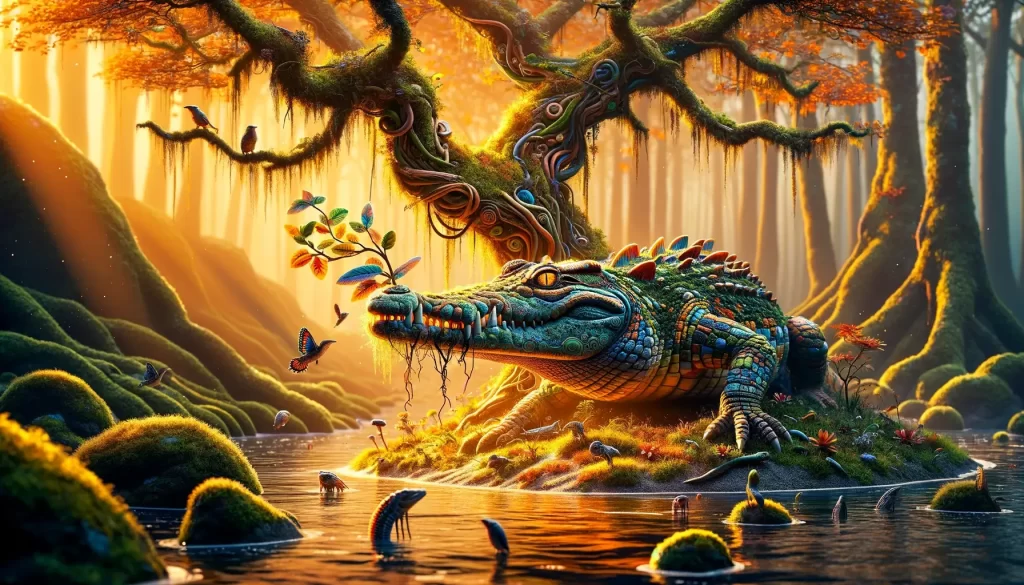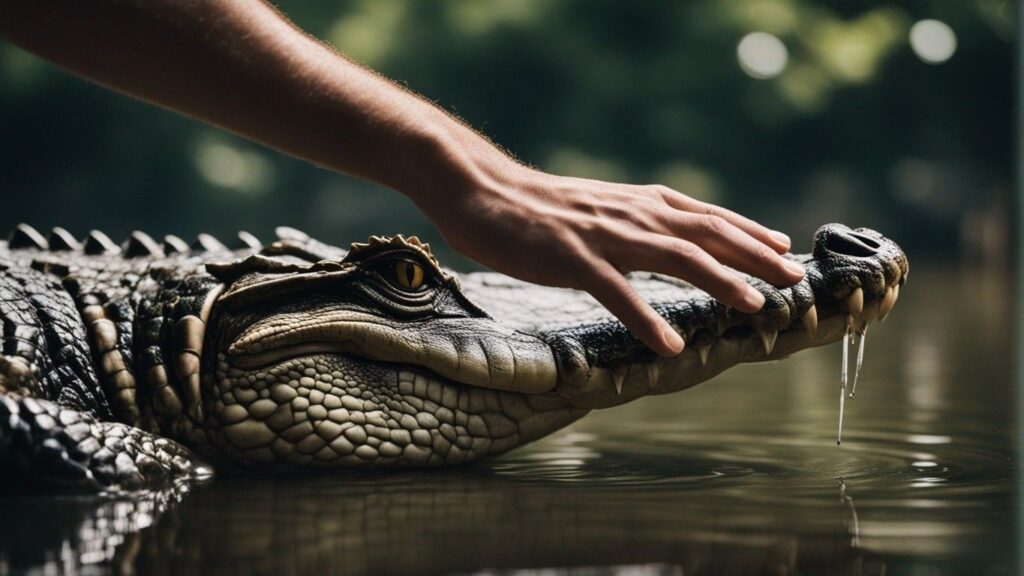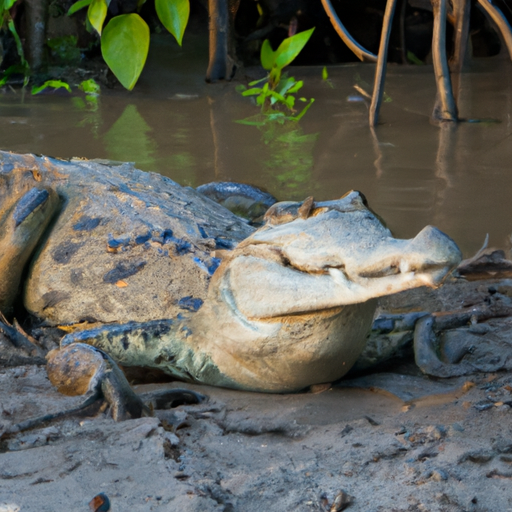
Crocodiles may strike fear into the hearts of many, but these ancient reptiles play a vital role in maintaining the delicate balance of ecosystems.
From the marshlands of Africa to the rivers of Australia, crocodiles are not just formidable predators but key players in maintaining healthy habitats.
By controlling populations of prey species, creating nesting sites, and even shaping the physical structure of their environments, crocodiles are essential for the overall health and biodiversity of our planet’s ecosystems.
In this article, we will explore the many reasons why crocodiles are important and why their conservation should be a top priority.
Maintaining Ecological Balance
Control Population of Prey Species
Crocodiles play a crucial role in maintaining the ecological balance by controlling the population of prey species. As apex predators, they help regulate the numbers of various animals, including fish, mammals, and birds, within their habitats. By preying on these animals, crocodiles prevent any overpopulation that could potentially disrupt the delicate balance of the ecosystem. This control ensures that resources are not depleted excessively, allowing for the survival and well-being of other species.
Indicators of Ecosystem Health
Crocodiles also act as indicators of ecosystem health. Their well-being and abundance reflect the overall condition of the ecosystems they inhabit. Because crocodiles are sensitive to changes in their environment, such as pollution or habitat degradation, any decline in their population or health can serve as a warning sign of ecosystem imbalances. Monitoring the status of crocodile populations and their habitats can provide valuable insights into the overall health of the ecosystem and help guide conservation efforts.
Competition with Other Predators
In addition to controlling prey populations, crocodiles also compete with other predators for resources. This competition ensures a healthy balance in predator-prey relationships within aquatic ecosystems. By occupying specific niches and feeding on different prey species, crocodiles prevent the dominance of a single predator and promote diversity in the predator community. This competition fosters a more resilient ecosystem, as different predators adapt to different hunting strategies and prey availability.
Ecological Role of Crocodile Eggs
Nourishment for Other Species
The role of crocodile eggs extends beyond their contribution to the crocodile population. The eggs serve as an essential food source for various other species in their habitats. For instance, numerous predators and scavengers rely on crocodile eggs as a crucial part of their diet. This dependence creates intricate food webs, where the availability of crocodile eggs directly affects the population dynamics and distribution of other species. Understanding and preserving the ecological role of crocodile eggs is therefore crucial for maintaining the biodiversity and functioning of these ecosystems.
Contributing to Nutrient Recycling
The hatching and consumption of crocodile eggs also contribute to nutrient recycling within ecosystems. As the eggs hatch and provide nourishment to predators and scavengers, the nutrients contained within them are transferred throughout the ecosystem. The redistribution of these nutrients helps sustain the growth and productivity of various plants and organisms, further emphasizing the importance of crocodile eggs in the nutrient cycling process. By promoting the recycling of nutrients, crocodiles contribute to a healthier and more sustainable ecosystem.

Biodiversity Conservation
Keystone Species
Crocodiles are considered keystone species, meaning they have a disproportionately large impact on their ecosystems compared to their abundance. Their presence and ecological role have far-reaching effects on the biodiversity and stability of their habitats. As apex predators, crocodiles help maintain the balance among prey species, control vegetation growth, and influence the behavior and distribution of other organisms. Without the presence of crocodiles, these ecosystems would undergo significant changes, potentially leading to ecological imbalances and loss of biodiversity.
Preserving Genetic Diversity
Another crucial aspect of crocodile conservation is the preservation of genetic diversity within their populations. Genetic diversity is essential for the long-term survival and adaptation of species to changing environmental conditions. A diverse gene pool enables crocodiles to withstand diseases, compete for resources, and adapt to new challenges. Conservation efforts focus on protecting different populations and promoting genetic connectivity between them, ensuring the preservation of the unique genetic traits and adaptations that crocodiles possess.
Contribution to Tourism Industry
Economic Benefits for Local Communities
Crocodiles contribute significantly to the tourism industry, providing economic benefits to local communities. Many regions with crocodile populations have established crocodile sanctuaries or conservation areas that attract tourists from around the world. Visitors have the opportunity to observe these magnificent creatures in their natural habitats, contributing to ecotourism initiatives. The revenue generated from tourism helps support local economies, create job opportunities, and raise awareness about the importance of conserving crocodiles and their habitats.

Cultural and Mythological Significance
Folklore and Traditional Beliefs
Throughout history, crocodiles have held cultural and mythological significance in various societies. They have been revered and often depicted in folklore, representing power, wisdom, and even deities in some cultures. These beliefs have influenced the relationship between humans and crocodiles, fostering a sense of respect and coexistence. The cultural importance of crocodiles is often reflected in art, rituals, and traditional stories, further emphasizing their significance beyond their ecological role.
Medical Research
Anti-bacterial Properties
Crocodiles possess unique immune systems that allow them to live in diverse environments, even those filled with potentially harmful bacteria. Research has shown that crocodile blood and tissues contain peptides with potent antibacterial properties, offering potential applications in medical research. These peptides have shown effectiveness against antibiotic-resistant bacteria, providing a promising avenue for developing new medications and combating the growing threat of antibiotic resistance.
Peptide Discovery
The study of crocodile peptides has also led to the discovery of novel compounds that show potential in various areas of medical research. These peptides have demonstrated anti-viral, antifungal, and even anti-cancer properties in laboratory studies. Further investigation and understanding of these compounds could potentially lead to the development of new drugs and treatments that benefit human health. Crocodile research in the field of medicine highlights the importance of preserving these incredible creatures as a source of inspiration for scientific discoveries.

Educational Value
Research and Learning Opportunities
Crocodiles offer significant educational value by providing research and learning opportunities. They serve as fascinating subjects for studying animal behavior, biology, ecology, and conservation. Research projects focusing on crocodiles help expand our understanding of their adaptations, breeding behaviors, migratory patterns, and roles within ecosystems. By studying crocodiles, scientists and students gain valuable insights into the complexities of the natural world and develop solutions for conservation challenges. Educational initiatives centered around crocodile research and conservation contribute to raising awareness and inspiring the next generation of scientists and conservationists.
Impact on Aquatic Systems
Modifying Watercourses
Crocodile habitats can often undergo modifications due to their activities, particularly in aquatic systems. Their digging and movement create burrows and channels that influence the flow and structure of watercourses. These modifications can have both positive and negative effects on the overall ecosystem. Crocodile-created burrows can provide shelter for various aquatic organisms, enhancing biodiversity and providing refuge during dry periods. However, excessive burrowing can also lead to erosion, impacting water quality and potentially altering the habitat of other species. Understanding the impact of crocodiles on aquatic systems is imperative for managing and conserving these ecosystems effectively.

Role in Seed Dispersal
Dispersing Seeds of Terrestrial Plants
Crocodiles play an unexpected role in seed dispersal. As they consume fruits and other plant material, the seeds contained within their diet are transported to different locations through their digestive system. Once excreted, these seeds have the potential to germinate and establish new plant populations. This process of seed dispersal, known as endozoochory, contributes to the diversity and distribution of terrestrial plants that rely on crocodiles for their propagation. Crocodiles thus contribute to the ecological functioning of both aquatic and terrestrial ecosystems, emphasizing their importance as key ecological players.
Crocodile Farming
Sustainable Use of Crocodile Resources
Crocodile farming has emerged as a sustainable practice that utilizes crocodile resources responsibly. Instead of relying solely on wild populations, crocodile farms breed crocodiles under controlled conditions, ensuring the conservation of wild populations and the sustainable use of their resources. These farms provide economic benefits by producing crocodile meat, leather, and other by-products. By promoting responsible farming practices, these operations contribute to the conservation of crocodile habitats, reduce pressure on wild populations, and cater to the demand for crocodile products in a sustainable manner.
Final thoughts
In conclusion, crocodiles are incredibly important for maintaining ecological balance, preserving biodiversity, contributing to various industries, and inspiring scientific discoveries.
Their role as apex predators, their impact on prey populations, and their influence on the overall health of ecosystems make them essential players in maintaining a healthy and thriving natural world.
By understanding and valuing the ecological, cultural, and economic significance of crocodiles, we can work towards their conservation and ensure the sustainability of their habitats for current and future generations to appreciate and benefit from.



